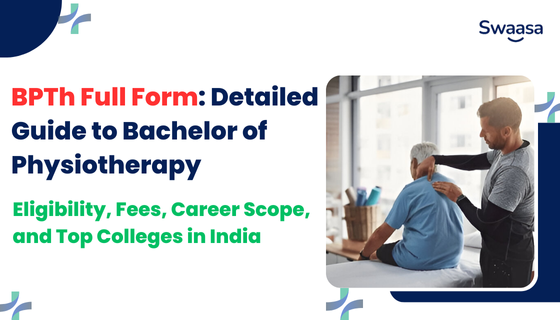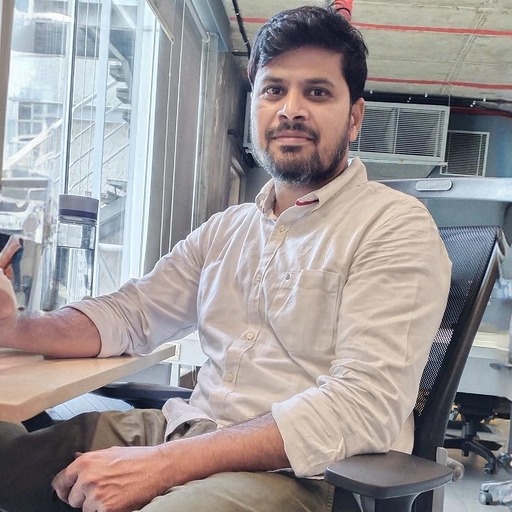
BPTh Full Form: Detailed Guide to Bachelor of Physiotherapy – Eligibility, Fees, Career Scope, and Top Colleges in India

08-Nov-2024
BPTh Full Form: Detailed Guide to Bachelor of Physiotherapy – Eligibility, Fees, Career Scope, and Top Colleges in India
1. Introduction to BPTh
BPTh Full Form and Overview
BPTh Full Form: The full form of BPTh is Bachelor of Physiotherapy, which is a specialized healthcare course designed for students passionate about helping others through physical rehabilitation. Unlike traditional medical degrees, BPTh focuses primarily on therapeutic practices that aid in mobility and recovery without the use of invasive surgery or heavy medications.
Why BPTh is Popular: With an increasing awareness of non-invasive treatments, physiotherapy has gained recognition. This field is especially sought after as more people seek recovery from injuries, lifestyle diseases, and age-related issues.

2. What is Physiotherapy and Why is it Important?
Definition and Scope of Physiotherapy
Physiotherapy, or physical therapy, is a healthcare discipline focused on diagnosing and managing physical disabilities and pain through movement, exercises, and manual therapy. This approach is key in treating conditions such as arthritis, sports injuries, post-surgical recovery, and more.
Role of Physiotherapists
Physiotherapists not only work directly with patients to improve mobility and reduce pain but also educate them on preventive measures. Their knowledge allows them to offer customized treatments for conditions like back pain, sports injuries, respiratory issues, and neurological impairments.
3. BPTh Course Details
Duration and Course Structure
Course Duration: The BPTh course generally spans 4.5 years, comprising four years of academic study followed by a mandatory six-month internship. This structure ensures students gain theoretical knowledge alongside practical exposure.
Core Subjects and Syllabus: Topics covered include Anatomy, Physiology, Biomechanics, Kinesiology, Electrotherapy, and Therapeutic Exercises. Each subject area helps students gain an understanding of the body and the techniques used to manage physical impairments.
Practical Exposure and Training
BPTh programs emphasize hands-on training in clinical settings, where students work under licensed physiotherapists. This experience helps students refine their skills and understand patient care dynamics before they start practicing independently.
4. BPTh Eligibility Criteria
Academic Requirements
To be eligible for BPTh, students must have completed their 10+2 with Physics, Chemistry, and Biology (PCB) as core subjects. Many institutions require a minimum of 50% marks, though this criterion may vary.
Entrance Exams and Admission Process
Admission into BPTh programs can be competitive, requiring entrance exams like NEET, CET, or specific university-level tests. Students scoring well in these exams are shortlisted for counseling and final admission.
5. BPTh Course Fees in India
Typical Fee Structure
Fees for BPTh courses vary widely. Government institutions generally offer affordable tuition fees, often ranging between INR 50,000 to 2 Lakhs. In contrast, private institutions may charge between INR 2 Lakhs to 5 Lakhs, depending on their facilities and infrastructure.
Scholarship Opportunities
Several scholarships are available for BPTh students, such as those offered by government bodies, private organizations, and merit-based programs. Scholarships like the National Scholarship Portal (NSP) and specific state scholarships for health science students help alleviate the financial burden.
6. BPTh Syllabus Breakdown
First Year
- Core Subjects: Anatomy, Physiology, Basic Biomechanics
- Practical Applications: Introduction to clinical practice
Second Year
- Core Subjects: Pathology, Microbiology, Pharmacology
- Practical Applications: Lab-based studies in body mechanics
Third Year
- Core Subjects: General Medicine, Surgery, Neurology
- Practical Applications: Clinical exposure in hospitals
Fourth Year
- Core Subjects: Orthopedics, Geriatrics, Community Physiotherapy
- Practical Applications: Intensive clinical and lab training
7. Comparison Table: BPTh vs. Other Medical Courses
BPTh (Bachelor of Physiotherapy)
- Duration: 4.5 Years
- Specialization: Physical rehabilitation
- Average Salary: ₹3-5 LPA
MBBS (Bachelor of Medicine and Surgery)
- Duration: 5.5 Years
- Specialization: General Medicine
- Average Salary: ₹5-8 LPA
BDS (Bachelor of Dental Surgery)
- Duration: 5 Years
- Specialization: Dentistry
- Average Salary: ₹4-6 LPA
BSc Nursing (Bachelor of Science in Nursing)
- Duration: 4 Years
- Specialization: Patient care
- Average Salary: ₹2.5-4.5 LPA
8. Top Colleges for BPTh in India
List of Renowned Colleges Offering BPTh
- All India Institute of Medical Sciences (AIIMS), Delhi
- Manipal University, Karnataka
- Jamia Millia Islamia, Delhi
- Christian Medical College (CMC), Vellore
Government vs. Private Colleges
Government institutions often have lower tuition fees and access to public hospitals for training, while private colleges may offer modern labs, research facilities, and campus placements.
9. Career Opportunities After BPTh
Top Job Roles for BPTh Graduates
- Clinical Physiotherapist: Work in hospitals or rehabilitation centers to provide therapy to patients.
- Sports Physiotherapist: Specialize in injury prevention and treatment for athletes.
- Pediatric Physiotherapist: Work with children with developmental disorders.
- Consultant in Private Practice: Many BPTh graduates start private practices.
Industries Hiring Physiotherapists
- Healthcare: Hospitals, clinics, nursing homes, and rehabilitation centers.
- Sports: Professional sports teams, fitness centers, and athletic organizations.
- Education: Institutions offering physiotherapy courses hire experienced practitioners.
10. BPTh Salary Expectations in India
Entry-Level vs. Experienced Professionals
Entry-level BPTh graduates typically earn between INR 2-3 LPA. With experience and specialization, salaries increase to INR 5-8 LPA or more, depending on the role and location.
High-Paying Sectors for Physiotherapists
Sports Industry: Professional teams and sports clinics often offer attractive pay packages.
Private Practice: Physiotherapists with successful private practices can earn significantly, especially in urban areas.
11. FAQs on BPTh (Bachelor of Physiotherapy)
1Q: What is the full form of BPTh?
Ans: BPTh stands for Bachelor of Physiotherapy, an undergraduate degree focused on physical therapy and rehabilitation.
2Q: Is BPTh a good career option?
Ans: Yes, BPTh is a promising career for those passionate about patient care, rehabilitation, and non-surgical treatment methods. It is a growing field with increasing demand in hospitals, sports, and wellness sectors.
3Q: What is the starting salary after BPTh in India?
Ans: Freshers with a BPTh degree typically earn between ₹2.5 to ₹3.5 lakhs per annum, depending on location, job role, and institution. With experience, this can increase significantly.
4Q: What is the total duration of the BPTh course?
Ans: The BPTh course usually lasts 4.5 years—comprising 4 years of academic education and a 6-month mandatory internship in a clinical setting.
5Q: Who is eligible to apply for a BPTh course?
Ans: To be eligible, candidates must have:
- Completed 10+2 in the Science stream
- Studied Physics, Chemistry, and Biology
- Scored a minimum of 50% aggregate marks (some colleges offer relaxation for reserved categories)
- Reached the age of 17 years by the time of admission
6Q: Is NEET mandatory for BPTh admission?
Ans: No, NEET is not compulsory for BPTh in most colleges. However, a few reputed institutions may consider NEET or conduct their own entrance tests.
7Q: What subjects are taught in BPTh?
Ans: The curriculum typically includes:
- Human Anatomy & Physiology
- Kinesiology and Biomechanics
- Electrotherapy & Exercise Therapy
- Orthopaedics, Neurology, and Cardiopulmonary Sciences
- Rehabilitation Techniques
- Ethics, Research, and Evidence-Based Practice
8Q: What career paths can a BPTh graduate pursue?
Ans: After BPTh, candidates can work as:
- Physiotherapists in hospitals or private clinics
- Sports physiotherapists for athletes or teams
- Rehabilitation specialists in old-age homes or trauma centers
- Lecturers in colleges or researchers in healthcare organizations
- Entrepreneurs running their own physiotherapy clinics
9Q: Can I study further after BPTh?
Ans: Yes, graduates can pursue Master of Physiotherapy (MPT) in various specializations such as neurology, sports science, or cardiopulmonary physiotherapy. Other options include MBA in Hospital Management or even Ph.D. programs in allied health sciences.
10Q: Can BPTh graduates use 'Dr.' before their name?
Ans: In India, many physiotherapists use the prefix 'Dr.' followed by 'PT' (e.g., Dr. Anil Sharma, PT). However, this is customary and not legally the same as an MBBS doctor. Usage may depend on institutional and regional norms.
11Q: What is the scope of BPTh in India and abroad?
Ans: The scope is expanding in both India and abroad due to rising awareness about physical rehabilitation. Physiotherapists are in demand in hospitals, wellness centers, fitness chains, nursing homes, and sports academies. Internationally, countries like the UK, Canada, and Australia offer good opportunities after required certifications.
12Q: Can I start my own clinic after BPTh?
Ans: Yes, once you complete the degree and register with the appropriate State or Central Physiotherapy Council, you can legally open a private practice or physiotherapy clinic.
13Q: How much does the BPTh course cost in India?
Ans: Fees vary by college:
- Government colleges: ₹40,000 – ₹1,00,000 per year
- Private institutions: ₹1,00,000 – ₹4,00,000 per year
14Q: What are some top colleges for BPTh in India?
Ans: Reputed institutions offering BPTh include:
- Manipal College of Health Professions
- Christian Medical College (CMC), Vellore
- Jamia Hamdard University, Delhi
- Institute of Health Sciences, Bhubaneswar
- K.J. Somaiya College of Physiotherapy, Mumbai
15Q: What is the difference between BPTh and BSc Physiotherapy?
Ans: BPTh is more clinical and practical in nature, often involving a compulsory internship and wider recognition in professional circles. BSc Physiotherapy may be more academic and less standardized in India, though both aim to train physiotherapists.
12. Conclusion
A BPTh degree offers a solid foundation for a career in physiotherapy, emphasizing patient care and rehabilitation. Graduates find opportunities in various sectors, including healthcare, sports, and education. This path allows one to make a significant impact on patient recovery and wellbeing, making it a fulfilling career choice in the healthcare domain.

AUTHOR

Related Jobs


